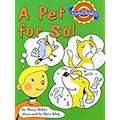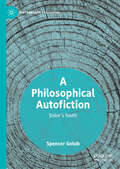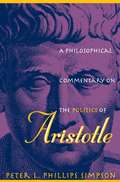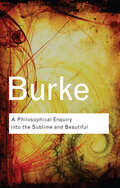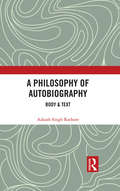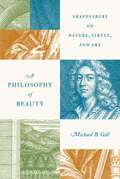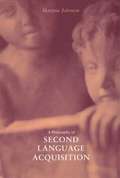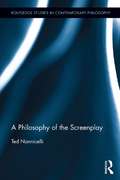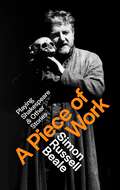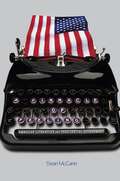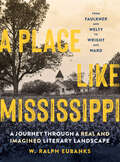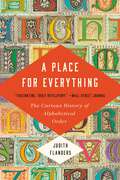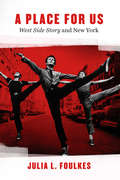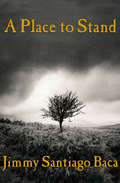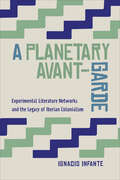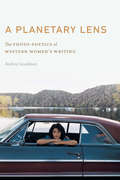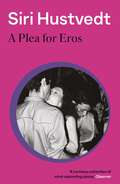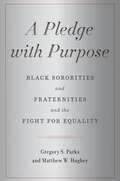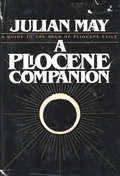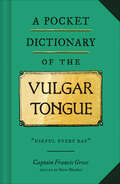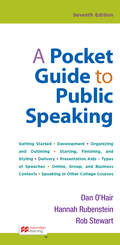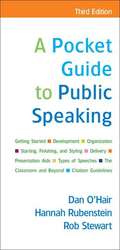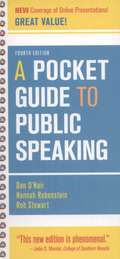- Table View
- List View
A Pet for Sol (Houghton Mifflin Reading Leveled Readers: Level 2.1)
by Mercy Haber"An interesting story after reading of which think about what you have read: 1 What is Sol's problem? 2 What do Sol and his mother do at the zoo? 3 Could any of the zoo animals really be a pet? Why or why not? 4 Do you think Sol will stop asking for a pet now that his parents let him have one?"
A Philosophical Autofiction: Dolor's Youth (Performance Philosophy)
by Spencer GolubThis is a book about what becomes of the truth when it succumbs to generational memory loss and to the fictions that intervene to cause and fill the gaps. It is a book about the impossibility of writing an autobiography when there is a prepossessing cultural and familial 'we' interfering with the 'I' and an 'I' that does not know itself as a self, except metastatically — as people and characters it has played but not actually been.A highly original combination of close readings and performative autobiography, this book takes performance philosophy to an alternative next step, by having its ideas read back to it by experience, and through assorted fictions. It is a philosophical thought experiment in uncertainty whose literary, theatrical, and cinematic trappings illustrate and finally become what this uncertainty is, the thought experiment having become the life that was, that came before, and that outlives the 'I am'.
A Philosophical Commentary on the Politics of Aristotle
by Peter L. SimpsonThe Politics, Aristotle's classic work on the nature of political community, has been a touchstone of Western debates about society and government. In this volume, Peter Simpson presents a complete philosophical commentary on the Politics, an analysis of the logical structure of the entire text and each of its constitutive arguments and conclusions. Unlike other contemporary works on the Politics, Simpson's philosophical commentary is not, save incidentally, a discussion of philological and historical questions, a speculative elaboration of Aristotle's arguments, or a comparison of the philosopher's ideas with those of other ancient and modern theorists. Such treatments, argues Simpson, must be grounded in a thorough understanding of the philosophical content of the work--a point that underscores the need for this thorough and accurate analysis. Keyed to the ancient Greek text as well as to Simpson's own innovative translation of it (UNC Press, 1997), this book will stand as a valuable commentary on the philosophical argument in the Politics and will serve as a sound basis for future study of Aristotle's political thought."A 'must read' for scholars of the Politics.--Choice"The entire edition is marked by a dashing boldness of judgment, and by confidence of tone and argumentation.--Polis"The commentary has many attractive features for the reader of Aristotle. All Greek is transliterated, and Bekker numbers are provided for easy cross-reference. Not least, it is written in clear and accessible prose. No reader of Aristotle's Politics can ignore this important work.--Classical WorldThe Politics, Aristotle's classic work on the nature of political community, has been a touchstone of Western debates about society and government. Here, Peter Simpson presents a thorough analysis of the logical structure of the entire text and each of its constitutive arguments and conclusions. A valuable commentary on the philosophical argument in the Politics, the book will also serve as a sound basis for future study of Aristotle's political thought. -->
A Philosophical Enquiry Into the Sublime and Beautiful: With An Introductory Discourse Concerning Taste And Several Other Additions (Routledge Classics)
by Edmund BurkeEdited with an introduction and notes by James T. Boulton. 'One of the greatest essays ever written on art.'– The Guardian Edmund Burke’s A Philosophical Enquiry into the Origin of our Ideas of the Sublime and Beautiful is one of the most important works of aesthetics ever published. Whilst many writers have taken up their pen to write of "the beautiful", Burke’s subject here was the quality he uniquely distinguished as "the sublime"—an all-consuming force beyond beauty that compelled terror as much as rapture in all who beheld it. It was an analysis that would go on to inspire some of the leading thinkers of the age, including Immanuel Kant and Denis Diderot. The Routledge Classics edition presents the authoritative text of the first critical edition of Burke’s essay ever published, including a substantial critical and historical commentary. Edmund Burke (1729–1797). A politician, philosopher and orator, Burke lived during a turbulent time in world history, which saw revolutions in America and France that inspired his most famous work, Reflections on the Revolution in France.
A Philosophy of Autobiography: Body & Text
by Aakash Singh RathoreThis book offers intimate readings of a diverse range of global autobiographical literature with an emphasis on the (re)presentation of the physical body. The twelve texts discussed here include philosophical autobiography (Nietzsche), autobiographies of self-experimentation (Gandhi, Mishima, Warhol), literary autobiography (Hemingway, Das) as well as other genres of autobiography, including the graphic novel (Spiegelman, Satrapi), as also documentations of tragedy and injustice and subsequent spiritual overcoming (Ambedkar, Pawar, Angelou, Wiesel). In exploring different literary forms and orientations of the autobiographies, the work remains constantly attuned to the physical body, a focus generally absent from literary criticism and philosophy or study of leading historical personages, with the exception of patches within phenomenological philosophy and feminism. The book delves into how the authors treated here deal with the flesh through their autobiographical writing and in what way they embody the essential relationship between flesh, spirit and word. It analyses some seminal texts such as Ecce Homo, The Story of My Experiments with Truth, Waiting for a Visa, I Know Why the Caged Bird Sings, A Moveable Feast, Night, Baluta, My Story, Sun and Steel, The Philosophy of Andy Warhol, MAUS and Persepolis. Lucid, bold and authoritative, this book will be of great interest to scholars and researchers of philosophy, literature, gender studies, political philosophy, media and popular culture, social exclusion, and race and discrimination studies.
A Philosophy of Beauty: Shaftesbury on Nature, Virtue, and Art
by Michael B. GillAn engaging account of how Shaftesbury revolutionized Western philosophyAt the turn of the eighteenth century, Anthony Ashley Cooper, the third Earl of Shaftesbury (1671–1713), developed the first comprehensive philosophy of beauty to be written in English. It revolutionized Western philosophy. In A Philosophy of Beauty, Michael Gill presents an engaging account of how Shaftesbury’s thought profoundly shaped modern ideas of nature, religion, morality, and art—and why, despite its long neglect, it remains compelling today.Before Shaftesbury’s magnum opus, Charactersticks of Men, Manners, Opinions, Times (1711), it was common to see wilderness as ugly, to associate religion with fear and morality with unpleasant restriction, and to dismiss art as trivial or even corrupting. But Shaftesbury argued that nature, religion, virtue, and art can all be truly beautiful, and that cherishing and cultivating beauty is what makes life worth living. And, as Gill shows, this view had a huge impact on the development of natural religion, moral sense theory, aesthetics, and environmentalism.Combining captivating historical details and flashes of humor, A Philosophy of Beauty not only rediscovers and illuminates a fascinating philosopher but also offers an inspiring reflection about the role beauty can play in our lives.
A Philosophy of Second Language Acquisition
by Marysia JohnsonHow does a person learn a second language? In this provocative book, Marysia Johnson proposes a new model of second language acquisition (SLA)--a model that shifts the focus from language competence (the ability to pass a language exam) to language performance (using language competently in real-life contexts). Johnson argues that current SLA theory and research is heavily biased in the direction of the cognitive and experimental scientific tradition. She draws on Vygotsky's sociocultural theory and Bakhtin's literary theory to construct an alternative framework for second language theory, research, teaching, and testing. The origin of second language acquisition is not located exclusively in the learner's mind, the author says, but in dialogical interaction conducted in a variety of settings.
A Philosophy of the Screenplay (Routledge Studies in Contemporary Philosophy)
by Ted NannicelliRecently, scholars in a variety of disciplines—including philosophy, film and media studies, and literary studies—have become interested in the aesthetics, definition, and ontology of the screenplay. To this end, this volume addresses the fundamental philosophical questions about the nature of the screenplay: What is a screenplay? Is the screenplay art—more specifically, literature? What kind of a thing is a screenplay? Nannicelli argues that the screenplay is a kind of artefact; as such, its boundaries are determined collectively by screenwriters, and its ontological nature is determined collectively by both writers and readers of screenplays. Any plausible philosophical account of the screenplay must be strictly constrained by our collective creative and appreciative practices, and must recognize that those practices indicate that at least some screenplays are artworks.
A Piece of Work: Playing Shakespeare and Other Stories
by Simon Russell BealeSimon Russell Beale is one of Britain's most recognisable and well-loved actors. He has played many roles on stage, film, television and radio - ranging from Winston Churchill to Stalin, George Smiley to King Arthur. But ever since his appearance at school as a glamorous Desdemona, complete with false eyelashes that rendered him half-blind, he has been captivated by Shakespeare. In A Piece of Work, Russell Beale tries to get under the skin of the playwright and find out what interested him. Was Shakespeare an instinctive 'conservative' or, rather, gently subversive? How collaborative was he? Did he add a line to Hamlet in order to accommodate his ageing and increasingly chubby principal actor, Richard Burbage? Did he suffer from insomnia and experience sexual jealousy? Russell Beale describes what it is to approach and live with some of Shakespeare's most famous characters. Some of the actor's inspiration comes from surprising sources. Watching Coronation Street gave him an idea for how Richard III might react on hearing of the death of the two Princes in the Tower; a visit to elderly patients in a local hospital gave him insights into King Lear's descent into madness; and the memory of childhood family holidays led him to a spectacular plunge into an ornamental pool in Much Ado About Nothing.Funny and touching about his family, Russell Beale also writes fascinatingly about some of the supremely creative people he counts as his friends - including Sam Mendes, Nick Hytner, Stephen Sondheim and Lauren Bacall. A Piece of Work is a brilliant account of an actor's life and work - and his relationship with our foremost dramatist.
A Piece of Work: Playing Shakespeare and Other Stories
by Simon Russell BealeSimon Russell Beale is one of Britain's most recognisable and well-loved actors. He has played many roles on stage, film, television and radio - ranging from Winston Churchill to Stalin, George Smiley to King Arthur. But ever since his appearance at school as a glamorous Desdemona, complete with false eyelashes that rendered him half-blind, he has been captivated by Shakespeare. In A Piece of Work, Russell Beale tries to get under the skin of the playwright and find out what interested him. Was Shakespeare an instinctive 'conservative' or, rather, gently subversive? How collaborative was he? Did he add a line to Hamlet in order to accommodate his ageing and increasingly chubby principal actor, Richard Burbage? Did he suffer from insomnia and experience sexual jealousy? Russell Beale describes what it is to approach and live with some of Shakespeare's most famous characters. Some of the actor's inspiration comes from surprising sources. Watching Coronation Street gave him an idea for how Richard III might react on hearing of the death of the two Princes in the Tower; a visit to elderly patients in a local hospital gave him insights into King Lear's descent into madness; and the memory of childhood family holidays led him to a spectacular plunge into an ornamental pool in Much Ado About Nothing.Funny and touching about his family, Russell Beale also writes fascinatingly about some of the supremely creative people he counts as his friends - including Sam Mendes, Nick Hytner, Stephen Sondheim and Lauren Bacall. A Piece of Work is a brilliant account of an actor's life and work - and his relationship with our foremost dramatist.
A Pinnacle of Feeling: American Literature and Presidential Government (20/21)
by Sean McCannThere is no more powerful symbol in American political life than the presidency, and the image of presidential power has had no less profound an impact on American fiction. A Pinnacle of Feeling is the first book to examine twentieth-century literature's deep fascination with the modern presidency and with the ideas about the relationship between state power and democracy that underwrote the rise of presidential authority. Sean McCann challenges prevailing critical interpretations through revelatory new readings of major writers, including Richard Wright, Gertrude Stein, Henry Roth, Zora Neale Hurston, Saul Bellow, Ralph Ellison, Norman Mailer, Don Delillo, and Philip Roth. He argues that these writers not only represented or satirized presidents, but echoed political thinkers who cast the chief executive as the agent of the sovereign will of the American people. They viewed the president as ideally a national redeemer, and they took that ideal as a model and rival for their own work. A Pinnacle of Feeling illuminates the fundamental concern with democratic sovereignty that informs the most innovative literary works of the twentieth century, and shows how these works helped redefine and elevate the role of executive power in American culture.
A Place Like Mississippi: A Journey Through a Real and Imagined Literary Landscape
by W. Ralph Eubanks&“This is the book all of us Mississippi writers, dead and alive, need to read. It is indeed a strange but glorious sensation to see your literary and geographic lineage so beautifully and rigorously explored and valued as it's still being created.&” —Kiese Laymon, author of Heavy: An American MemoirIn A Place Like Mississippi, award-winning author and Mississippi native W. Ralph Eubanks treats us to a literary tour of the evocative landscapes that have inspired writers in every era. From Faulkner to Wright, Welty to Trethewey, Mississippi has been both a backdrop and a central character in some of the most compelling prose and poetry of modern literature.The journey unfolds on a winding path, touching the muddy Delta, the rolling Hill Country, down to the Gulf Coast, and all points between. In every corner of the state lie the settings that informed hundreds of iconic works.Immersing us in these spaces, Eubanks helps us understand that Mississippi is not only a state but a state of mind. Or as Faulkner is said to have observed, &“To understand the world, you must first understand a place like Mississippi.&”
A Place for Everything: The Curious History of Alphabetical Order
by Judith FlandersFrom a New York Times-bestselling historian comes the story of how the alphabet ordered our world.A Place for Everything is the first-ever history of alphabetization, from the Library of Alexandria to Wikipedia. The story of alphabetical order has been shaped by some of history's most compelling characters, such as industrious and enthusiastic early adopter Samuel Pepys and dedicated alphabet champion Denis Diderot. But though even George Washington was a proponent, many others stuck to older forms of classification -- Yale listed its students by their family's social status until 1886. And yet, while the order of the alphabet now rules -- libraries, phone books, reference books, even the order of entry for the teams at the Olympic Games -- it has remained curiously invisible.With abundant inquisitiveness and wry humor, historian Judith Flanders traces the triumph of alphabetical order and offers a compendium of Western knowledge, from A to Z.
A Place for Us: “West Side Story” and New York
by Julia L. FoulkesFrom its Broadway debut to the Oscar-winning film to countless amateur productions, West Side Story is nothing less than an American touchstone--an updating of Shakespeare vividly realized in a rapidly changing postwar New York. That vision of postwar New York is at the heart of Julia L. Foulkes's A Place for Us. A lifelong fan of the show, Foulkes became interested in its history when she made an unexpected discovery: scenes for the iconic film version were shot on the demolition site destined to become part of the Lincoln Center redevelopment area--a crowning jewel of postwar urban renewal. Foulkes interweaves the story of the creation of the musical and film with the remaking of the Upper West Side and the larger tale of New York's postwar aspirations. Making unprecedented use of director and choreographer Jerome Robbins's revelatory papers, she shows the crucial role played by the political commitments of Robbins and his fellow gay, Jewish collaborators, Leonard Bernstein and Arthur Laurents. Their determination to evoke life in New York as it was actually lived helped give West Side Story its unshakable sense of place even as it put forward a vision of a new, vigorous, determinedly multicultural American city. Beautifully written and full of surprises for even the most dedicated West Side Story fan, A Place for Us is a revelatory new exploration of an American classic.
A Place to Stand: The Making Of A Poet
by Jimmy Santiago BacaThe Pushcart Prize–winning poet&’s memoir of his criminal youth and years in prison: a &“brave and heartbreaking&” tale of triumph over brutal adversity (The Nation). Jimmy Santiago Baca&’s &“astonishing narrative&” of his life before, during, and immediately after the years he spent in the maximum-security prison garnered tremendous critical acclaim. An important chronicle that &“affirms the triumph of the human spirit,&” it went on to win the prestigious 2001 International Prize (Arizona Daily Star). Long considered one of the best poets in America today, Baca was illiterate at the age of twenty-one when he was sentenced to five years in Florence State Prison for selling drugs in Arizona. This raw, unflinching memoir is the remarkable tale of how he emerged after his years in the penitentiary—much of it spent in isolation—with the ability to read and a passion for writing poetry. &“Proof there is always hope in even the most desperate lives.&” —Fort Worth Star-Telegram &“A hell of a book, quite literally. You won&’t soon forget it.&” —The San Diego U-T &“This book will have a permanent place in American letters.&” —Jim Harrison, New York Times–bestselling author of A Good Day to Die
A Planetary Avant-Garde: Experimental Literature Networks and the Legacy of Iberian Colonialism (Toronto Iberic #81)
by Ignacio InfanteA Planetary Avant-Garde explores how experimental poetics and literature networks have aesthetically and politically responded to the legacy of Iberian colonialism across the world. The book examines avant-garde responses to Spanish and Portuguese imperialism across Europe, Latin America, West Africa, and Southeast Asia between 1909 and 1929. Ignacio Infante critically traces the hegemony and resistance to the colonial regimes of Spain and Portugal across particular avant-garde networks, expanding our understanding of Western colonial and imperial ideologies of the early twentieth century. The book extends geopolitical dimensions of the historical avant-garde into a wider transnational and planetary framework, including divergent experiences of modernity, forms of experimental poetics, and understandings of history. It sheds light on topics, such as the relation between Portuguese futurism and European colonialism in West Africa, the Latin American avant-garde’s critique of European historicism, the development of Brazilian modernism in relation to the European avant-garde, the comparative poetics of modernism in the Philippines, and the 1929 Barcelona World’s Fair. Grounded in extensive archival research, A Planetary Avant-Garde provides a new understanding of the historical avant-garde from a global and multilingual perspective.
A Planetary Lens: The Photo-Poetics of Western Women's Writing (Postwestern Horizons)
by Audrey GoodmanA Planetary Lens delves into the history of the photo-book, the materiality of the photographic image on the page, and the cultural significance of landscape to reassess the value of print, to locate the sites where stories resonate, and to listen to western women&’s voices. From foundational California photographers Anne Brigman and Alma Lavenson to contemporary Native poets and writers Leslie Marmon Silko and Joy Harjo, women artists have used photographs to generate stories and to map routes across time and place. A Planetary Lens illuminates the richness and theoretical sophistication of such composite texts. Looking beyond the ideologies of wilderness, migration, and progress that have shaped settler and popular conceptions of the region, A Planetary Lens shows how many artists gather and assemble images and texts to reimagine landscape, identity, and history in the U.S. West. Based on extensive research into the production, publication, and circulation of women&’s photo-texts, A Planetary Lens offers a fresh perspective on the entangled and gendered histories of western American photography and literature and new models for envisioning regional relations.
A Plea For Eros
by Siri HustvedtA stunning collection of essays by the author of WHAT I LOVED, in which she addresses many of the themes explored in her novels - identity, sexual attraction, relationships, family, mental illness, the power of the imagination, a sense of belonging and mortality. In three cases, she focuses on the novels of other writers - Dickens, James and Fitzgerald. She also refers to her own novels, affording an unusual insight into their creation. Whatever her topic, her approach is unaffected, intimate and conversational, inviting us both to share her thoughts and reflect on our own views and ideas.
A Pledge with Purpose: Black Sororities and Fraternities and the Fight for Equality
by Matthew W. Hughey Gregory S. ParksReveals the historical and political significance of “The Divine Nine”—the Black Greek Letter OrganizationsIn 1905, Henry Arthur Callis began his studies at Cornell University. Despite their academic pedigrees, Callis and his fellow African American students were ostracized by the majority-white student body, and so in 1906, Callis and some of his peers started the first, intercollegiate Black Greek Letter Organization (BGLO), Alpha Phi Alpha. Since their founding, BGLOs have not only served to solidify bonds among many African American college students, they have also imbued them with a sense of purpose and a commitment to racial uplift—the endeavor to help Black Americans reach socio-economic equality. A Pledge with Purpose explores the arc of these unique, important, and relevant social institutions. Gregory S. Parks and Matthew W. Hughey uncover how BGLOs were shaped by, and labored to transform, the changing social, political, and cultural landscape of Black America from the era of the Harlem Renaissance to the civil rights movement. Alpha Phi Alpha boasts such members as Thurgood Marshall, civil rights lawyer and US Supreme Court Justice, and Dr. Charles Wesley, noted historian and college president. Delta Sigma Theta members include Bethune-Cookman College founder Mary McLeod Bethune and women’s rights activist Dorothy Height. Huey P. Newton, co-founder of the Black Panther Party, who left an indelible mark on the civil rights movement, was a member of Phi Beta Sigma, while Dr. Mae Jemison, a celebrated engineer and astronaut, belonged to Alpha Kappa Alpha. Through such individuals, Parks and Hughey demonstrate the ways that BGLO members have long been at the forefront of innovation, activism, and scholarship.In its examination of the history of these important organizations, A Pledge with Purpose serves as a critical reflection of both the collective African American racial struggle and the various strategies of Black Americans in their great—and unfinished—march toward freedom and equality.
A Pliocene Companion (The Saga of Pliocene Exile)
by Julian MayThe author of the acclaimed Pliocene Quartet offers an in-depth guide to a saga that &“has most closely matched J. R. R Tolkien's achievement&” (San Francisco Chronicle). With its richly imagined universe and large cast of finely-drawn characters, Julian May&’s Saga of Pliocene Exile has won devoted fans across the globe who find new layers, details, and ideas with each reading. In the words of Isaac Asimov's Science Fiction Magazine: &“Julian May has made a new and fresh masterwork in the genre and has irrevocably placed herself among the great of fantasy and science fiction.&” Covering all four novels—The Many-Colored Land, The Golden Torc, The Nonborn King, and The Adversary—this reading guideoffers a plot chronology, the author's original maps, a descriptive listing of all the characters, and three delightful interviews with May herself. Beyond that, it gives the reader a chance to explore further the surroundings of a world six million years in the past. The glossary gives information on metapsychology, on the futuristic science of the Galactic Milieu, and on the exotic world of the Tanu and Firvulag. In all, A Pliocene Companion is a must for followers of the Saga.
A Pocket Dictionary of the Vulgar Tongue
by Captain Francis GroseA profane guide to the slang from eighteenth-century London&’s backstreets and taverns and how to use the antique jargon and curse words in modern conversation. This slang dictionary gathers the most amusing and useful terms from English history and helpfully presents them to be used in the conversations of today. Originally published in 1785, A Classical Dictionary of the Vulgar Tongue was one of the first lexicons of English slang, compiled by a militia captain who collected the terms he overheard on his late-night excursions to London&’s slums, dockyards, and taverns. Now the legacy lives on in this colorful pocket dictionary. Learn the origin of phrases like &“birthday suit&” and discover slang lost to time An unexpected marriage of lowbrow humor and highbrow wit A Pocket Dictionary of the Vulgar Tongue is perfect for enlivening contemporary conversation with historical phrases; it includes a topical list of words for money, drunkenness, the amorous congress, male and female naughty bits, and so on. A funny book for wordplay, language, swearing, and insult fans, as well as fans of British humor and culture Perfect for those who loved How to Speak Brit: The Quintessential Guide to the King&’s English, Cockney Slang, and Other Flummoxing British Phrases by Christopher J. Moore; Knickers in a Twist: A Dictionary of British Slang by Jonathan Bernstein; and The Official Dictionary of Sarcasm by James Napoli
A Pocket Guide to Public Speaking
by Dan O'Hair Rob Stewart Hannah RubensteinO’Hair, A Pocket Guide to Public Speaking is a student success guide to public speaking in an abbreviated, easy-to-use format.
A Pocket Guide to Public Speaking (2nd edition)
by Dan O'Hair Rob Stewart Hannah RubensteinBased on the highly successful Speaker's Guidebook, A Pocket Guide to Public Speaking offers all of the material typically covered in a full-sized text -- from invention, research, and organization to practice and delivery -- in a concise format perfect for any course across the curriculum or day-to-day setting.
A Pocket Guide to Public Speaking (3rd edition)
by Dan O'Hair Rob Stewart Hannah RubensteinThis best-selling brief introduction to public speaking offers practical coverage of the material typically covered in a full-sized text -- from invention, research, and organization to practice and delivery -- in a concise format perfect for any setting across the curriculum, on the job, or in the community.
A Pocket Guide to Public Speaking (Fourth Edition)
by Dan O'Hair Rob Stewart Hannah RubensteinThe book has tools needed to prepare and deliver a wide range of speeches and presentations covering all steps necessary to create a speech-from planning, research, and development to organization, practice, and delivery.
